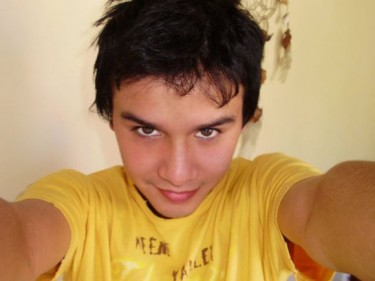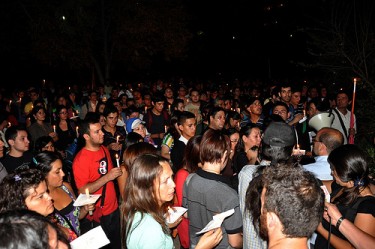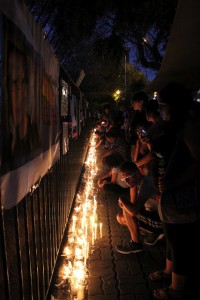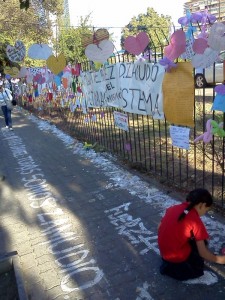Este bestial, cruel y despiadado ataque no pasará a la historia como un asalto más, o como una noticia de crónica roja más. Te prometo que lucharemos y combatiremos para que esta práctica nefasta sea extirpada de nuestra sociedad.
This brutal, cruel and ruthless attack will not go down in history as just another assault, or crime news. I promise that we will fight and combat so this harmful practice is removed from our society.
That was the promise Marcos Cárdenas, a Jesuit and philosophy student at the Alberto Hurtado University, made in his open letter [es]. He, as many other Chileans, expressed his grief after a group of men barbarously beat Daniel Zamudio, a young gay man, on March 3, 2012.

Daniel Zamudio Vera. Picture taken from the Internet from various sources.
The Clinic [es] published a summary of the story according to declarations of the men accused of beating and torturing Zamudio:
Todo empezó la madrugada de un sábado, en las cercanías de un cuartel policial y en un parque vigilado por guardias, un grupo de matones masacró a golpes a Daniel Zamudio, un joven homosexual que estaba allí. Lo torturaron seis horas y nadie vio nada. De los cuatro agresores, uno dicen que es claramente neonazi. El resto, una mezcla de lumpen y descarriados. Pero todos hoy están acusados de participar en uno de los ataques más salvajes que se recuerden en Santiago.
[…] Sobre él estaban Fabián Mora, Alejandro Angulo y Pato Core golpeándolo nuevamente. Esta vez con más fuerza, con “patadas, combos en la cabeza, en la cara, en los testículos, en las piernas, por todo el cuerpo”. López reconoce que pegó un par de patadas. A esa altura, cuenta, Zamudio ya sangraba por la nariz y la cara. Estaba tan ido por la borrachera y los golpes -dice-, que ni siquiera tuvieron que afirmarlo cuando Angulo y Pato Core le escarificaron tres esvásticas con el gollete de una botella de pisco sour Campanario, que minutos antes habían quebrado en su cabeza.[…]
It all started on a Saturday early in the morning, close to a police station and a park secured by guards. A group of thugs massacred Daniel Zamudio, a young gay man that was hanging out there. They tortured him for six hours and nobody saw anything. One out of the four aggressors is said to be a neo-Nazi. The rest, a mixture of ill-bred misfits. But today, all of them are accused of participating in one of the most savage assaults ever seen in Santiago.
[…] On top of him were Fabián Mora, Alejandro Angulo and Pato Core hitting him again. This time stronger and with “kicks, punches in the head, face, testicles, legs, and all over the body”. López admits that he kicked him a couple of times. At this point, he said, Zamudio was already bleeding through the nose and face. He was so unconscious because of alcohol and punches – he said – that they didn't even need to hold him when Angulo and Pato Core tattooed three swastikas with the neck of a Campanario pisco sour bottle that they broke minutes before on his head. […]
In this post we show some of the reactions from blogs, online news sites and Twitter since the news broke and until March 27, when Daniel Zamudio's death was announced [es].

Candlelight protest for Daniel Zamudio in Santiago. Photo taken on 03/22/2012 by Flickr user Movilh Chile (CC BY-NC-ND 2.0)
Anti-Discrimination Law
The Anti-Discrimination Law that has been stuck in Congress for seven years has come back as a trending topic after the attack on Zamudio. There has even been a request to call it Zamudio Law [es] and to carry on the discussion at the Parliament's Mixed Commission after the last vote [es] that took place in November 2011.
Marcos Alvo, in a column called “Tolerance for Dummies” [es], published by El Dínamo, sentenced:
[…] Es por eso que necesitamos con urgencia la aprobación de la Ley Antidiscriminación (LAD). Legislar no cumple el único propósito de coaccionar , sino -más importante aun- el de ser un manifiesto social acerca de lo que nosotros como país queremos reflejar, con lo que estamos de acuerdo y con lo que no estamos dispuestos a tranzar.
[…] That is why we urgently need the approval of the Anti-Discrimination Law (LAD). Legislating does not only fulfill the objective of coercing, it is also – and most importantly – a social manifesto of what we as a country want to reflect, what we agree upon and what we are not willing to compromise.
To that respect, the President of the Jewish Community in Chile, Shai Agosin, pointed out [es]:
Por desgracia, la ley antidiscriminación, como está hoy día, no incluye una institucionalidad, no incluye políticas públicas ni un ministerio que esté encargado de llevarla adelante de buena forma.

Candlelight protest for Daniel Zamudio at the Posta Central (Central Hospital). Taken from the J. blog with Javiera Tapia's (author) permission.
Unfortunately, the anti-discrimination law, as it is today, does not include institutions, does not include public policies or a ministry that will be responsible to enforce it in a good way.
Diversity or tolerance?
Lala from the blog Zancada [es] reflected:
Recordé qué poco nos enseñan de diversidad, de lo aislados que estamos geográfica y mentalmente. Sé que en muchos casos no es así, pero si encendemos la tele y vemos cómo se burlan de los homosexuales, de los peruanos, de los “distintos”, no nos están enseñando a integrarlos a todos, sino que nos dicen que es mejor reírnos de ellos o huir. Dicen que la xenofobia se cura viajando, y qué cierto es. Cuando te das cuenta de que ese que tiene otro color de piel u otro acento, o cree en otro dios, no te hará nada, que es en el fondo igual a ti, te haces más persona y pierdes el miedo. Eres un poco más libre.
Y lo mejor es que ni siquiera sería necesario viajar si aquí en nuestras casas nos lo dijeran. Si en los colegios nos contaran. Si la tele y los medios lo mostraran.
I remember how little is taught to us about diversity, how isolated we are geographically and mentally speaking. I know that in many cases this is not true, but if we turn on the TV and watch how they mock gays, Peruvians, the “different one”, we are not being taught to include everyone, we are told that it is better to laugh at them or run from them. They say xenophobia is cured by travelling, and it's very true. When you realize that those who have a different skin color or accent or believes in a different God is not going to harm you, that he or she is like you, you become more human and lose the fear. You are freer.
And the best part is that it wouldn't be necessary to travel if here, in our homes, they told us. If they told us in schools. If the TV and the media showed it.
Beatriz Gimeno shared her thoughts in a column at El Ciudadano (The Citizen) [es]:
No estar activamente posicionado en contra de cualquier tipo de discriminación es dar alas al odio y a la violencia. No hace falta llamar directamente a la violencia legitimar la violencia. No reconocer que las personas lgtb somos merecedores de exactamente los mismos derechos, es no querer reconocer que somos merecedores del mismo respeto, de la misma dignidad; es no querer reconocer que compartimos exactamente la misma humanidad. Y finalmente cuando no se reconoce la misma humanidad ni la misma dignidad, se termina por favorecer que alguien entienda que somos merecedores de algún tipo de castigo.
Not being actively involved against any type of discrimination is to boost hate and violence. You don't need to directly incite violence to legitimize violence. Not recognizing that we, LGBT people, are worthy of respect, of the same dignity; it is about not wanting to recognize that we share exactly the same humanity. And finally, when the same humanity is not recognized nor the same dignity, you end up understanding that someone thinks we deserve some type of punishment.
Marcos Alvo, in the previously quoted column, added:
Si hasta hablar de tolerancia me parece intolerante. Decir: “te tolero” suena de un egocentrismo absoluto. Quien soy yo para “tolerar”. Es casi como afirmar que a pesar de tu diversidad te permito vivir en mi país. WTF.
Even speaking about tolerance seems intolerant to me. Saying: “I tolerate you” sounds absolutely selfish. Who am I to “tolerate”. It's like asserting that despite your diversity, I allow you to live in my country. WTF.
Supporting Daniel

Protest in support of Daniel Zamudio and his family in Curicó, Chile. Picture by Twitter user @JParadaHoyl used with his permission.
Since day one, declarations backing Daniel and disavowing his attackers appeared under the hashtags #FuerzaDanielZamudio [es] and #DanielZamudio [es].
A movement that advocates and defends human rights of lesbian, gays, bisexual and transsexuals, Movilh Chile (@Movilh) [es], constantly kept its followers informed about Daniel's health progress and started a campaign [es] that invited Twitter users to lighten up their avatar with a virtual candle to show their support.
Among the famous who expressed their solidarity was Ricky Martin (@ricky_martin) who tweeted:
Last night I won a @Glaad award! I am honored and thankful and would like to dedicate it to
#DanielZamudio and his family#Chile
Also, several candlelight protests have been taking place in several parts of the country like Antofagasta [es], Santiago [es] and Curicó demanding justice for Daniel. You can see more pictures of one of the protests at the front of the hospital where Daniel Zamudio was staying at the J. Blog [es]
Daniel's death
On Twitter, Chileans reacted as soon as they found out about Daniel's decease.
Conti (@gcontador) [es] stated:
Antes que lo mataran, lo ningunearon los políticos que tú elegiste, se rieron de el los humoristas que tú premias y lo condenó tu iglesia
Before he was murdered, the politicians you elected looked down on him, the comedians you praise laughed at him, the religion you follow condemned him
From Viña del Mar, user @Festitroll [es] criticized:
Lloran la muerte de
#DanielZamudio pero se burlan de Hinzpeter por ser Judio y gritan a Zalaquett por ir a la posta. Rica tu tolerancia
People cry #DanielZamudio's death but they mock Hinzpeter (Chilean Interior Minister) for being Jewish and Zalaquett (Santiago Major) for going to the hospital. Nice tolerance.
The famous Chilean TV host Rafael Araneda (@RafaAraneda) [es] commented:
Q tremendo ! Murió
#DanielZamudio no lo puedo creer… Es un hecho q habla muy mal de nuestros tiempos y de lo q nos rodea…
What a shock! #DanielZamudio died, I can't believe it… It's a fact that speaks very ill of our times and surroundings
Similarly, TV host Carolina Urrejola (@CarolaUrrejola) concluded:
Algo edificante en medio del dolor: una sociedad entera está escandalizada.
#DanielZamudio.
Something good came out of this pain: an entire society that is outraged. #DanielZamudio.







2 comments